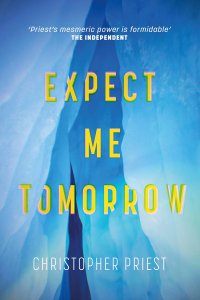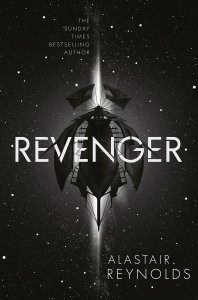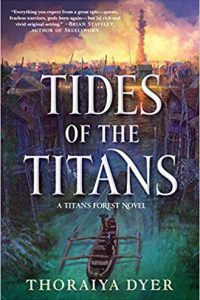Paul Di Filippo Reviews Expect Me Tomorrow by Christopher Priest
 Expect Me Tomorrow, Christopher Priest (Gollancz 978-1473235137, hardcover, 336pp, £22.00) September 2022 (US edition December 2022).
Expect Me Tomorrow, Christopher Priest (Gollancz 978-1473235137, hardcover, 336pp, £22.00) September 2022 (US edition December 2022).
In 2023, Christopher Priest turns eighty, a non-trivial milestone. His first short story sale dates to 1966, giving him a career, so far, of over 55 years. And, remarkably, as his new novel amply illustrates, he is still working at the top of his form. SFWA Grand Master nomination, anyone?
Expect Me Tomorrow is less surreal and recomplicated than his books from the Dream Archipelago sequence. It is also a bit less eerie and arcane than his other novels outside that mythos, the ones set in overlapping contemporary and historical venues. It would be silly and reductive to call it “Priest Lite,” or “Priest 101,” but it has some sense of being pared down to his core visionary take on life. Maybe getting older forces one to focus more on essentials, and less on trappings. In any case, it’s a subtle, resonant, impactful tale that is both urgent and timeless, whose text might be about various tragedies, but whose overall arc is redemptive and cathartic.
We open with an historical account of a British con man in the year 1877, a sharper who preys on women. He offers only the name “John Smith,” even when he is tried and sentenced to prison. So far, so interesting, albeit of enigmatic consequence. Then our focus turns to two brothers during the years 1868 to 1904, twins named Adolf and Adler Beck. Adolf is a “grasshopper,” easy-going and unserious. Adler is an “ant,” committed to following in the weighty footsteps of his father, a famous expert on glaciers. Priest will build up intimate histories of both men, although we rely mainly on Adler’s POV. We watch as Adolf pursues an opera career in South America, while Adler falls in love with Meredith, a fellow scientist. Adler’s main theorizing concerns the return of a dire second Ice Age, which he forecasts to happen about the year 2050. The paths of the two brothers weave in and out of proximity and harmony, and their intermittent chapters form a whole family history.
One uncanny thing, however. Both men are subject to hallucinations, interludes when a strange voice rings in their heads, causing bodily paralysis. Is this a hereditary disease? Lacking any answers, they learn to brace themselves for the unpleasant and puzzling moments, which, fortunately, do not occur that often.
But in the meantime, the reader will also enter closely into the lives of two other brothers, twins named Chad and Greg Ramsey living in the year 2050. Again, we center on one brother, Chad, apprehending Greg’s doings through Chad’s eyes. In this case, both brothers are responsible citizens, although Greg’s career is more daring and out-there, as he functions as a journalist in the world’s danger zones. Married but childless, Chad lives back in the UK and works as a police profiler, shaping masses of raw data into solvable cases. However, he has recently been laid off. But not before the government has installed some useful hardware and software in his brain, a kind of telelink to the internet. Then along comes Chad’s pal Pat, an inventor, who gifts him with a gadget that might help his future bouts of profiling, if any, a “visualizer.” But what no one foresees is that Chad’s cyberadjuncts, in connection with this new device, will form a kind of mental time machine, enabling Chad to reach back psychically to his own ancestors—Adolf and Adler Beck. Yes, Chad’s clumsy probes are the very cause of the Beck brothers’ bouts of paralysis.
The subsequent tangle of a secret or lost past influencing the present, and a domineering “future” influencing the past forms the gist of the book. There are no real chrono-paradoxes engendered, but rather a kind of cosmic patterning which seems both self-originating yet consciously articulated. I won’t reveal how everything falls neatly and satisfyingly into place, but it certainly does—including the case of “John Smith.” It’s a kind of fusion between Gregory Benford’s Timescape and Robert Nathan’s Portrait of Jennie.
Part of the mystery and irony of how the two eras relate stems from the disparate climate change themes. Adler Beck, given the science of his time, is convinced that a new Ice Age that will doom civilization is imminent. Meanwhile, the Ramsey boys are living in pure Greenhouse Earth hell. Priest’s depiction of this climate-change future is unique in current cli-fi fiction. It’s far from a “cozy catastrophe,” but it has a muted, melancholy, elegiac, Aldissian (Greybeard) atmosphere about it. It’s more pallid entropy than Armageddon.
Life in Hastings, and other areas of Britain surviving the changes, went on with a sense of consensual normality. In fact it was a form of collective cognitive dissonance. The rest of the world was in bad shape… But Chad had a liveable home, and he and his wife both pursued active professional careers…
[But] the future no longer bore thinking about.
So, tomorrow? What to expect of tomorrow?
The future had become a sequence of days: they survived this day, worked through it as it came, managed somehow. Tomorrow dawned with the apprehension that something else might have to be survived, worked through, managed. They lived on the edge. How long before they would have to join the general drift away from the increasingly hazardous sea-shore, try to find somewhere to live inland that was higher and safer, perhaps a little cooler and with better facilities, a more tolerable refuge, along with the hundreds of thousands of other people all seeking the same temporary solution to a permanent nightmare?
….He had heard talk in the town, and on the daily news feed, that one day, not long from now, Hastings and several other south-coast towns would have to be abandoned, evacuated.
Already the physical symbols of civilization were serving notice. The hospital was taking emergency or casualty cases only, and a handful of private patients. The maternity wing was about to close. The trains still ran, but not all the time and not every day. Food shops maintained supplies for now. The town drains were often clogged, the electricity supply was intermittent, no one drank tap water. It was becoming difficult to find a supplier of fuel for the generator, none of the roads had been repaired in years. The town had a persistent back-ground odour: the smell of sewage, of hot road tar, of diesel generators, of spilled garbage and droppings and the remains of the dead.
This exactly nails the kind of psychic malaise many people feel even in 2022, captured in Priest’s typically elegant and understated prose.
Like William Gibson’s recent work, in which communication between parallel “stub” timelines illustrates both estrangement and connection, Priest’s book shows us that invisible cords of cause and effect and sentiment unite us all.
 While you are here, please take a moment to support Locus with a one-time or recurring donation. We rely on reader donations to keep the magazine and site going, and would like to keep the site paywall free, but WE NEED YOUR FINANCIAL SUPPORT to continue quality coverage of the science fiction and fantasy field.
While you are here, please take a moment to support Locus with a one-time or recurring donation. We rely on reader donations to keep the magazine and site going, and would like to keep the site paywall free, but WE NEED YOUR FINANCIAL SUPPORT to continue quality coverage of the science fiction and fantasy field.
©Locus Magazine. Copyrighted material may not be republished without permission of LSFF.







